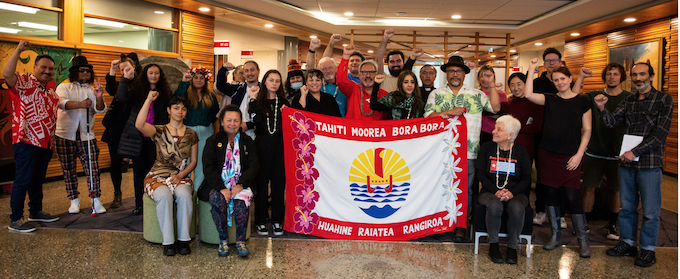By Ena Manuireva and Tony Fala
About 35 people joined an Auckland rally last Sunday in solidarity with a Mā’ohi Nui Lives Matter demonstration by thousands of Tahitians happening in Pape’ete, the capital.
In solidarity and in sync with the Pape’ete event, the Mai te Paura Atōmī i te ti’amara’a: From Bomb Contamination to Self-determination rally was organised by Les Tahitiens de Nouvelle-Zélande (Tahitians of New Zealand) and hosted at Auckland University of Technology.
Ena Manuireva and colleague Tony Fala were the main organisers at AUT.
With the live feed from Tahiti in the background, the message was clear to those who attended:
- French nuclear tests were wrong, killed people, and destroyed the environment; and
- France must now pay reparations.
The organisers wanted to remind the audience about the important date of July 17, 1974, as the largest radioactive nuclear test named Centaur — a test that contaminated more than 100,00 people which was nearly the entire population of Mā’ohi Nui at the time.
Nine takeaways from the event
- This rally is the start of more solidarity action for Mā’ohi Nui people. We hope to engage more members of the Mā’ohi Nui community living in Aotearoa in this work.
- It is reassuring to have the support of rally speakers in Auckland who represent different peoples of Oceania.
- The nuclear issue in Mā’ohi Nui is being commemorated in other ways in Aotearoa. The Auckland Museum launched an exhibition on Remembering Moruroa and the Christchurch Art Gallery Te Puna o Waiwhetū is celebrating the artistic vision of one of Aotearoa’s most significant artists, the late Ralph Hotere. His collection includes the Moruroa watercolours — which has a fitting title, Ātete! (to resist).
- The organisers plan to have further meaningful discussions with the Green MPs concerning the Mā’ohi Nui issues. They hope to work with Green MPs to develop concrete proposals so that the issue of nuclear waste in Mā’ohi Nui can be tabled in Parliament.
- The organisers intend to reach out to the Department of Disarmament and Arms Control. They plan to talk to Nuclear Disarmament Minister Phil Twyford about this issue.
- In the same vein, the organisers will approach the Ministry of Education to propose changes to the new school curriculum emerging in 2022 — changes that would include the teaching of the history of the anti-nuclear stand that New Zealand took in Oceania.
- Rally organisers Ena, David, James, Mua, and Tony acknowledge the support of Greenpeace, former members of NFIP, and Peace Movement Aotearoa.
- The organisers thank Mahealani Coxhead, Tasha Dalton, Ma’ara Maeva, Sally Manuireva, and Jos Wheeler for their invaluable contributions to the rally.
- The organisers thank the Auckland rally audience and express solidarity to Oscar Temaru over the continuing struggle in Mā’ohi Nui.
The MC and speakers

Reverend Mua Strickson-Pua is an activist, educator, and poet. He was the master of ceremonies for the rally and event co-organiser. He introduced all the speakers.

Ena Manuireva is a Mangarevan-Tahitian, Mā’ohi Nui activist whose story started back on his native island of Mangareva. Mangarevans were the first people in French-occupied Polynesia to be used as guinea pigs and contaminated during the first so-called “clean” French nuclear tests on July 2, 1966. Ena narrated the personal story of how his mother became sick and vomited as her lips bled after she unknowingly ate contaminated fish; of how his older sister had weak bones as a baby, and how she developed a vulnerable body that forced his family to flee to Tahiti to save her life and find refuge. Manuireva challenged France to restore truth and justice through reparations and to return independence to Mā’ohi Nui.
The generation that paved the path for activism in Aotearoa and around the Moana-Nui-a-Hiva:

Hilda Halkyard-Harawira is a distinguished Māori activist, community worker, educator, and founder of the Nuclear Free and Independent Pacific Movement (NFIP). She shared some rich impressions regarding her work as a Māori activist working in the NFIP movement from 1980. Hilda told the moving story of travelling with Māori activists to Mā’ohi Nui in 1995; of witnessing the vibrant anti-nuclear struggle in Tahiti, and of meeting Mā’ohi anti-nuclear protest leaders Charlie Ching and Oscar Temaru. She read extracts from an important address she presented at a 1995 anti-nuclear activist gathering in Tahiti. Moreover, Hilda spoke of her great friendship with Oscar Temaru while expressing her abiding support for Mā’ohi Nui’s struggle for nuclear justice and for independence from France today. Hilda Halkyard-Harawira’s rich address reminded the audience of the profound whakapapa interlinking Māori activists with Mā’ohi Nui, the wider Pacific, and the NFIP Movement.

Maire Leadbeater is of Pākehā heritage. She is an activist, former Auckland city councillor, historian, and writer. Maire is a member of West Papua Action Auckland. Maire expressed solidarity with Mā’ohi Nui in her oration. She explained why West Papua is not on the United Nations list of territories to be decolonised. Maire provided an important update on the contemporary West Papua struggle. Maire Leadbeater’s speech allowed the rally audience space to consider the significance of the West Papua struggle alongside that of the noble Mā’ohi Nui resistance in wider Oceania.

Dr David Robie is a Pākehā environmental activist, editor of Asia Pacific Report, and retired founding director of the AUT Pacific Media Centre. He sees events during his career around the Pacific, including French-occupied Polynesia, as a “game changer”. Those events include the publication of the book Moruroa Mon Amour in the 1970s by Bengt and Marie-Therese Danielsson, Tahiti-based activists, describing their outrage regarding the use of Moruroa as the testing site, leading up to the recent publication of the book Toxic and its damning revelations about France’s persistent lies over the nuclear tests. He also mentioned his Blood On Their Banner on Pacific independence struggles, first published in Swedish in spite of censorship thanks to the Danielssons’ contacts, and his inspiration from meeting Oscar Temaru which contributed to his commitment to the Mā’ohi Nui cause. David demands compensation for the harm done by the nuclear tests, a formal apology to the Mā’ohi Nui people, and a return of their independence.
Political support to the cause shown by the Greens:

Teanau Tuiono is of Māori and Atiu heritage. He is a member of parliament for the Green Party and a long time indigenous environmental activist. Teanau articulated the story of the abiding relationships interconnecting the peoples of Atiu and Mā’ohi Nui. He spoke powerfully about the visits of Atiu men to Mā’ohi Nui to work in the phosphate industry in years gone by. Teanau affirmed Oceanian solidarity towards the peoples of Mā’ohi Nui in his korero. Further, he acknowledged that Oceania’s peoples are bound together by the twin whakapapa of both genealogy and shared struggle. Teanau narrated the story of how he marched in support of the Mā’ohi Nui people as a student activist in 1995. Moreover, he spoke of being part of the group who hosted Oscar Temaru at Waipapa Marae at the University of Auckland after the march. Tuiono’s oration provided the audience opportunity to understand the solidarity Māori and Pacific Island peoples have extended to Mā’ohi Nui in Aotearoa since the 1990s.

Golriz Ghahraman is of Iranian descent. She is a member of parliament for the Green Party, a lawyer, and a community advocate for migrants and refugees. Speaking as a former refugee to Aotearoa, Golriz extended her solidarity to Oscar and the Mā’ohi Nui people in her speech. She illuminated the connections between Mā’ohi Nui; struggles in the wider Pacific; refugees, and migrants. Golriz spoke of the importance of the Palestinian struggle in her labours. She provided the rally audience with the ability to reflect upon the interconnections between the Mā’ohi Nui struggle — and that of the Palestinian, refugee, and migrant communities within and beyond Oceania.
The emergence of the young generation of activists:

James Hita is a Māori Greenpeace activist and coordinator for Greenpeace Deep Sea Mining. His message was unequivocal: nuclear tests are not isolated threats; they are part of the many perils that are directly impacting our Ocean. Climate change, nuclear tests, and deep-sea mining all negatively impact upon our most important natural food supply, Te Moana-Nui-a-Hiva. His message was a constant call to awareness for all of us that we must stand united and fight together against the many wrongdoings inflicted upon our Moana-Nui-a-Hiva.

Anevili TS is a Samoan activist and media worker who represents Indigenous Pacific Uprising (IPU) and Te Ara Whatu activist organisations. A link for her oral presentation at the conference can be found here. Anevili critiqued French colonialism in Mā’ohi Nui. Further, she reminded her audience that the climate change and nuclear issues cannot be separated in Mā’ohi Nui or in wider Oceania. Anevili extended solidarity to Oscar and the Mā’ohi Nui people and invited the French to get out of the Pacific. Anevili’s powerful address articulated the message that younger people in the Moana in Aotearoa stand in solidarity with Mā’ohi Nui today.

India Logan-Riley is a Māori climate change activist, an Indigenous rights campaigner, and a member of Te Ara Whatu. She talked about the whakapapa (genealogy) that the Mā’ohi Nui people have with their land and how France is trying to steal and destroy the land. She highlighted the difficult position New Zealand occupies at the UN- New Zealand is in alliance with other colonial powers such as France. However, she commended the resilience of the Mā’ohi Nui population after more than a quarter of a century since the last nuclear tests were done. She reiterated her support for justice and reparations for the Mā’ohi Nui people. India’s talk reminded the audience of the immensely strong relationships between indigenous Pacific peoples and their lands.
The panel of speakers included young activists as the organisers wanted to acknowledge the increasingly vital role that young people will play in the future by standing up to all kinds of challenges — while acknowledging the vital role of our activist elders who have come before us.
Emerging young activists will be the ones to hold the New Zealand government to account for their lack of action on environmental issues.
Younger activists will also have to stand up and reprimand other countries when other nations’ actions threaten the people and the planet.
Acknowledgements
The Auckland rally was only one expression of solidarity for the Mā’ohi Nui people beyond Tahiti: Messages of solidarity from Fiji (Claire Slatter), Micronesia, and the wider ‘Sea of Islands’ were presented to the people of Mā’ohi Nui via video message and social media.
On behalf of all the organisers, Reverend Mua Strickson Pua:
- Acknowledged the kinship linkages connecting all of the peoples of Oceania.
- Affirmed the continuing struggles of the indigenous peoples of Aotearoa, Australia, Hawai’i, Kanaky, Mā’ohi Nui, Micronesia, Rapa Nui, West Papua, and others.
- Upheld the work of tangata whenua protectors and supporters in Aotearoa in the struggles at Aotea Island, Ihumātao, Pūtiki, and Shelly Bay.
- Affirmed the interconnections between climate change, nuclear issues, and deep-sea mining as oceanic issues requiring collective responses from all peoples of the “Sea of Islands” together.

Article by AsiaPacificReport.nz





